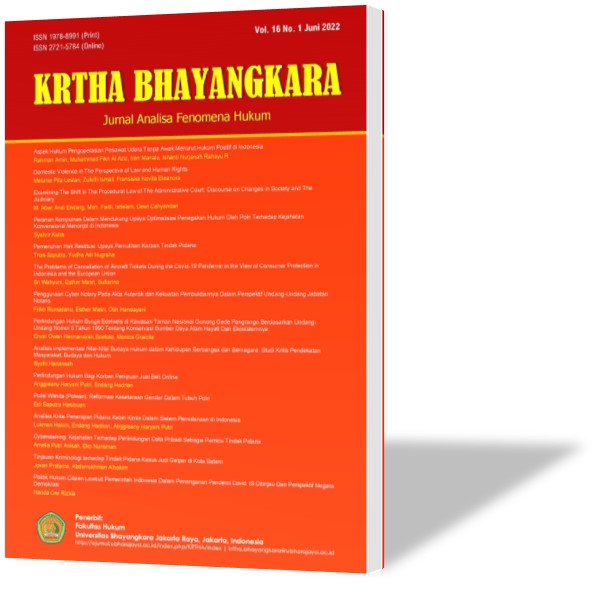Perlindungan Konsumen Produk Skincare Pada Penjualan Secara Online
DOI:
https://doi.org/10.31599/krtha.v17i3.781Keywords:
customer protection, online buying and sellingAbstract
Skincare is a skin care product that is popular among the majority of female consumers. One way to obtain skincare products is through online purchases, which, despite its advantages, also has disadvantages such as not meeting expectations (cheap prices but containing harmful substances) and being prone to fraud. The aim of this research is to understand the regulations regarding online buying and selling and consumer protection for skincare products using the online buying and selling system, particularly in terms of negative impacts on consumer health. This research is a doctrinal study that utilizes primary, secondary, and tertiary legal sources. The results of this research are as follows: Firstly, the online buying and selling of skincare products through marketplaces, as stipulated in Articles 1457 and 1458 of the Civil Code, utilize electronic contracts that include the identification of the parties involved, object and specifications, requirements for electronic transactions, pricing and costs, cancellation procedures, rights of aggrieved parties, and dispute resolution. Online buying and selling is recognized as a legitimate and accountable electronic transaction based on Government Regulation Number 71 of 2019 on the Implementation of Electronic Systems and Transactions. Online buying and selling is also regulated by the fatwa of the National Sharia Council of the Indonesian Ulema Council, No. 05/DSN-MUI/IV/2000, which provides provisions regarding payment, goods, parallel salam, goods delivery, cancellation, and disputes. Secondly, consumers of skincare products through online buying and selling are protected by the state both preventively through legislation (Consumer Protection Law No. 8 of 1999, Health Law No. 36 of 2009, Law No. 19 of 2016 on Amendments to Law No. 11 of 2008 on Electronic Information and Transactions, Civil Code, and Criminal Code) and repressively (compensation by businesses; non-litigation through the Consumer Dispute Settlement Board (BPSK); litigation through the courts).
References
Buku-buku
Abdul Halim Barkatullah, 2017, Hukum Transaksi Elektronik Di Indonesia, Bandung: NusaMedia
Adam Luthfi, et. al., 2020 Statistik E-commerence 2020, Jakarta: Badan statistik Indonesia
Edmon Makarim. 2005. Pengantar Hukum Telematika, Suatu Kompulasi Kajian. Jakarta: PT. RajaGrafindo.
Janus Sidabalok, 2014. Hukum Perlindungan Konsumen di Indonesia, Bandung: Citra Aditya Bakti
M. Arsyad Sanusi, 2005. Hukum Teknologi dan Informasi, Tim Kemas Buku, Jakarta, Muchsin, 2003. Perlindungan dan Kepastian Hukum Bagi Investor di Indonesia, Universitas Sebelas Maret Surakarta
Phillipus M. Hadjon, 1987. Perlindungan Hukum Bagi Rakyat Indonesia, PT. Bina Ilmu, Surabaya
Rasjid, Sulaiman. 2001. Fiqh Islam. Bandung: Sinar Baru Algensindo
Shirdarta, 2006. Hukum Perlindungan Konsumen Indonesia, Grasindo
Soerjono Soekanto, 2010. Penelitian Hukum Normatif, Jakarta: Rajawali Press
Widjaja, G. 2003. Hukum tentang Perlindungan Konsumen Vol 2. Jakarta: Gramedia
Jurnal-Jurnal
Mizan; Akad Salam Dalam Transaksi Jual Beli. Jurnal Ilmu Syariah, FAI Universitas Ibn Khaldun (UIKA) Bogor. Vol. 4 No. 1. 2016
Subianto, T. Studi Tentang “Perilaku Konsumen Beserta Implikasinya Terhadap Keputusan Pembelian”. Jurnal Ekonomi Modernsasi, Vol. 3, No. 3, 2007
Vindya Donna Adindarena, Vira Trinette Adriana Djar, Mumun Surahman, Pengaruh Motif Pembelian Rasional Dan Emosional Terhadap Keputusan Pembelian Skin Care Pada Remaja Perempuan Dan Perempuan Dewasa, Jurnal Riset Ekonomi, Vol. 2, No. 2, 2022
Yusa, V. De. “Pengaruh Motif Rasional dan Motif Emosional Terhadap Keputusan Pembelian Ponsel Blackberry di Bandar Lampung”. Jurnal Ekonomi Dan Manjamen, Vol. 9, No. 2, 2015
Peraturan Perundang-Undangan
Undang-Undang Dasar 1945
Kitab Undang-Undang Hukum Perdata
Kitab Undang-Undang Hukum Pidana
Undang-Undang No. 8 Tahun 1999 tentang Perlindungan Konsumen
Undang-Undang No. 36 tahun 2009 tentang Kesehatan
Undang-Undang No. 19 Tahun 2016 tentang Perubahan Atas Undang-Undang Nomor 11 Tahun 2008 Tentang Informasi Dan Transaksi Elektronik
Dewan Syariah Nasional (DSN) MUI No: 05/DSN-MUI/IV/2000 tentang Jual Beli Salam
Internet
https://sikapiuangmu.ojk.go.id/FrontEnd/CMS/Article/20608
https://www.klikdokter.com/gaya-hidup/perawatan-wanita/bahaya-membeli-kosmetik-di-toko-online
https://www.jawapos.com/surabaya-raya/01434236/bpom-surabaya-take-down-link-penjualan-kosmetik-online-ilegal diakses pada 13 Mei 2023
https://store.sirclo.com/blog/marketplace-di-indonesia/
https://www.hukumonline.com/klinik/a/perlindungan-hukum-terhadap-konsumen-lt50bf69280b1ee
https://www.ocbcnisp.com/id/article/2022/04/07/akad-salam-adalah
Downloads
Published
Issue
Section
License
Copyright (c) 2024 Otih Handayani, Esther Masri

This work is licensed under a Creative Commons Attribution 4.0 International License.



































